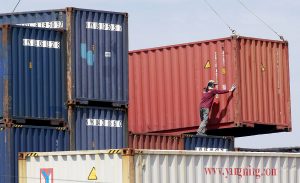Cost of doing business, navigating international rules hindering wider Philippine utilization of trade deals
EXPORTERS lack the knowledge to tap trade agreements and face a higher cost of doing business in the Philippines, rendering their products uncompetitive relative to other countries’ exports, a business group said.

By Justine Irish D. Tabile, Reporter
EXPORTERS lack the knowledge to tap trade agreements and face a higher cost of doing business in the Philippines, rendering their products uncompetitive relative to other countries’ exports, a business group said.
The Philippine Chamber of Commerce and Industry said cost-of-doing-business issues center on high power and logistics costs.
“The cost of doing business is still quite high (here) compared to the other countries… These are some of the issues that the government has to address for us to really gain full benefit from (taking advantage of) free trade agreements (FTAs),” PCCI President George T. Barcelon told BusinessWorld by phone.
Mr. Barcelon said that aside from incentives, the Philippines must seek to be a competitive market as it is yet to see strong, sustained inflows of foreign direct investment (FDIs).
 “It is top of mind in our meeting with the Anti-Red Tape Authority and foreign chambers that there are these issues to be addressed,” he said.
“It is top of mind in our meeting with the Anti-Red Tape Authority and foreign chambers that there are these issues to be addressed,” he said.
“As of now, we are not seeing any real good inflow of FDIs as investments are still headed towards Vietnam, Indonesia, and Thailand. This is something that needs work,” he added.
Net inflows of FDI slumped to their lowest level in over three years, amounting to $422 million in September. This was 42.2% lower year on year and down by 46.5% from a month prior.
This brought the FDI net inflows to $5.9 billion in the first nine months of the year, representing a 15.9% decline from a year earlier.
Mr. Barcelon said that the Philippines must upskill its workers to move its products higher up the value ladder.
“Once we have increased to a higher value, be it agricultural or electronic products… the other thing that I think the government must be aware is the cost of compliance and permits,” he said.
He said that the added costs do not align with the government’s target of rightsizing the bureaucracy.
“What businesses see is that there is more bureaucracy, and bureaucracy sometimes can be interpreted as the flip side of corruption,” he added.
Last year, the Philippines improved its ranking on the global corruption index compiled by Transparency International. It placed 116th out of 180 countries in the 2022 Corruption Perceptions Index, a spot higher than its worst-ever showing of 117th place in 2021.
Despite the improvement in ranking, the Philippine score was 33, its lowest ever in the index and below the global average of 43 and the Asia-Pacific average of 45.
TRADE DEALS
Trade and Industry Undersecretary Allan B. Gepty said some investment must be made in navigating the preferential arrangements and their compliance rules to be in a position to access trade agreements.
“There are still many businesses who are not that aware of these preferential arrangements, including compliance procedures,” Mr. Gepty said in a Viber message.
“The continuing program is for advocacy and education so that exporters can avail of the preferential arrangements and other businesses can be encouraged to export or even do business in other countries,” he added.
Mr. Gepty said the Department of Trade and Industry (DTI) plans to sustain its campaign to inform and educate stakeholders on the benefits of FTAs such as the Regional Comprehensive Economic Partnership (RCEP) and other preferential agreements such as the European Union’s (EU) Generalised Scheme of Preferences Plus (GSP+).
The Philippines has been a beneficiary of the GSP+, a special trade scheme for vulnerable low- and lower-middle-income countries, since 2014. GSP+ grants zero duties on 6,274 Philippine products.
The current arrangement was set to expire by the end of 2023. However, the Council of EU Member States and the European Parliament amended the GSP scheme to extend it to 2027.
Under the current scheme, eligible countries, such as the Philippines, will have to comply with 27 international conventions on human rights, labor rights, climate action, and good governance.
The Philippines was threatened with the loss of its GSP+ status during the Duterte administration due to European concern over extrajudicial killings and alleged human rights violations.
The Duterte administration’s “war on drugs” was condemned by the European Parliament in a resolution passed in February 2022, which asked the country to act on human rights abuses.
On the other hand, RCEP, the world’s biggest FTA involving a third of the global economy, counts among its members Association of Southeast Asian Nations, Australia, China, Japan, New Zealand, and South Korea.
The deal aims to increase trade among RCEP participants by allowing minimal to zero restrictions on shipment volumes, tariffs, and import taxes.
The Philippines was the last participating country to ratify the FTA on June 2, more than two and a half years since the participating countries concluded the deal in November 2020.
Mr. Gepty said that the late ratification is one of the reasons why it is still too early to assess RCEP utilization in the Philippines.
“Since its implementation in the Philippines only started in June, it would still be too early to gather and process data. We are coordinating with concerned agencies to gather relevant data for purposes of monitoring,” he said.
Mr. Barcelon added: “RCEP was just ratified in the middle of the year, so it will take some time to really get the benefits from it.”
He said that most RCEP countries are already Philippine trading partners.
“Some of the benefits that I would see are for our agricultural sector to be able to expand their market in Japan, among others,” he added, citing the benefits of the lowered tariffs for Philippine produce under RCEP.
Tereso O. Panga, director-general of the Philippine Economic Zone Authority (PEZA), said there has been an increase in investment approvals from some RCEP countries.
“There has been a marked increase in our ecozone investment approvals this year from Australia and China, countries we consider in PEZA as non-traditional sources of economic zone (ecozone) FDI and exports,” Mr. Panga said in a Viber message.
“Clearly, we can attribute this trade and investment market diversification to the country’s recent accession to RCEP,” he added.
PEZA reported that approved investments from Australia more than doubled to P772.82 million in the first 11 months while investments from China grew 65.8% to P1.28 billion during the period.
“With the entry of more Chinese and Australian investors, we can expect these locators to be exporting their products and services back to their principal headquarters or to other RCEP member countries to take advantage of the lower trade barriers and improved market access from trading partners,” Mr. Panga said.
He said that the increase in investment after the implementation of trade agreements was also seen in the case of European countries.
“We see the same trend with the huge growth in ecozone FDI from EU member countries. In addition, we expect our ecozone exports to the EU to likewise achieve a significant increase given the latter’s continued grant of GSP+ privileges to Philippine exporters,” he said.
“With PEZA accounting for more than 60% of the exports of goods and commodities, we are pursuing more locators seeking to avail of the benefits under RCEP and the proposed EU-Philippines FTA to grow their operations in the country,” he added.
In the first 11 months, PEZA approved P16.56 billion in investments from EU member countries, sharply higher compared with the P2.44 billion in approvals a year earlier.
Philip Dupuis, head of trade for the EU Delegation to the Philippines, said the Philippines retains the potential to more fully utilize GSP+.
“Utilization by the Philippines… has been relatively good. I think we are utilizing two-thirds of the eligible exports, more or less, if I remember well, but it could be better,” Mr. Dupuis said in a chance interview.
He said that it is important to determine whether exporters have an ingrained preference for trading with nearby or familiar markets.
“I think there is a lot of work for us to do in terms of making the European market better known, but the companies also need to inform themselves because all the materials are there,” he said.
“Obviously, if you are satisfied with your exports to Japan and the US, then you don’t necessarily look at the EU market. But I think the potential is there; there is potential to grow for Philippine companies in Europe,” he added.
Mr. Dupuis also said that the EU legislators are still looking to update the GSP+ scheme after the current deal’s extension, as the EU Council and Parliament have yet to reach agreement on updating GSP rules.
The EU and the Philippines have also resumed talks for an FTA since the suspension of the negotiations in 2017. Negotiations were put on hold due to issues over intellectual property rights and data exclusivity, among others.
The two parties are expected to complete the initial phase of the negotiations by the end of December, which involves the identification of the chapters that would form part of the FTA.
The two first launched negotiations for an FTA in 2015.
Rizal Commercial Banking Corp. Chief Economist Michael L. Ricafort said that there is also a need to push the participation of micro, small, and medium enterprises (MSMEs) to further increase utilization of GSP+.
“Some MSMEs that are part of the export supply chain and ecosystem have yet to maximize the potential of GSP+,” Mr. Ricafort said in a Viber message.
He added that supporting “online businesses and transactions would also be able to maximize the economic benefits and potential of these FTAs, given their immense possibilities to expand export markets.”
Mr. Ricafort said FTAs are helpful for effectively expanding the markets of Philippine exporters at much reduced cost, making them more competitively priced.
He said such trade deals also attract more investment, with investors from nearby countries using the Philippines as a stepping stone to access the benefits of preferential agreements such as GSP+.














